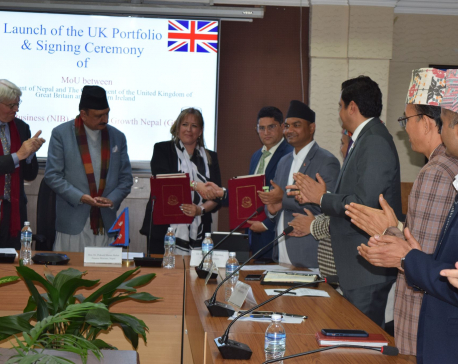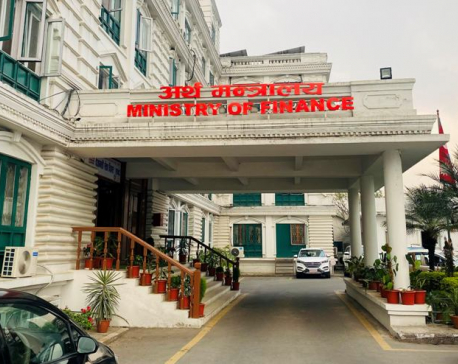
OR
Subsidy money of Rs 8.5 billion sent to farmers cut short by Ministry of Finance
Published On: February 21, 2023 07:20 PM NPT By: Dilip Paudel

Increase in agricultural products being imported from abroad
KATHMANDU, Feb 21: The government allocated Rs 8.5 billion to be spent through the provincial and local levels for agricultural self-sufficiency programs to increase production. However, the Ministry of Finance has withheld Rs 8.457 billion of this subsidy amount meant for Nepali farmers while the agricultural products worth millions of rupees are being imported from abroad instead of promoting home-grown products.
The Ministry of Finance decided to hold the subsidy amount meant for the farmers as a part of its austerity measures after the government failed to meet the revenue-collection target.
Experts in the agricultural sector say that this will affect agricultural production while the import of agricultural products will increase.
The Ministry of Agriculture and Livestock Development confirmed that the subsidy announced for the farmers at the local level under the government’s agricultural program has been put on hold. Prakash Kumar Sanjel, spokesperson for the Ministry of Agriculture and Livestock Development, said that the Ministry of Finance has instructed the Financial Comptroller General Office (FCGO) to freeze the budget.
"The budget announced in the form of conditional grants for the self-sufficient agricultural production program at the provincial and local levels has been transferred to other headings," said spokesperson Sanjel, adding, "The program has been postponed due to the budget cut."
Representatives of the farmers expressed disappointment over the government’s decision to cut the budget allocated for increasing agricultural products at the local level while encouraging imports from abroad. Uddhav Adhikari, the former president of the National Farmers Group Federation (NFGF), said that instead of increasing the budget in agriculture, the government has done exactly the opposite. "Production has not been able to increase due to insufficient budget allocation in agriculture," Adhikari said, "Instead of encouraging farmers, the government has also cut the allocated budget." The government has not been able to spend the budget in various other sectors including infrastructure.
Funds were allocated under the independent agriculture program to increase the production of food grains, vegetables, fruits, milk and meat. The budget was sent to the local level under the financial transfer program for the plan to increase the production of agricultural products and make them self-sufficient by replacing imports. Under this program, there was a plan to build market infrastructure from the subsidies announced for the farmers. The program was expected to give incentives to the farmers to increase production. There were also plans to operate agricultural ambulances at the local level and implement the minimum support price from this budget.
These programs are going to be affected by the decision to freeze the budget. In the absence of modernization, mechanization and commercialization in agriculture, the country’s dependence on imported agro products is increasing.
In the first five months of the current fiscal year, agricultural products worth around Rs 31.5 billion have been imported into the country. Out of the 4.048 million metric tons of rice consumed in Nepal, 3.180 million metric tons are produced domestically, while about 867,000 metric tons of rice are imported from abroad. Vegetables and other food items are also being imported from abroad.
Bhim Prasad Dhungana, president of the Municipal Association of Nepal (MuAN), said that the decision to cut the agriculture budget was wrong when the investment in agriculture is decreasing. Dhungana said, "Instead of giving relief to farmers, the federal government is making a mistake by withholding the agriculture budget. If there is no investment in agriculture, imports cannot be substituted. In order to increase production, it is necessary to increase investment in agriculture."
The government allocated a budget of Rs 55.97 billion for the Ministry of Agriculture and Livestock Development in the current fiscal year. The budget mentions programs to provide seeds, fertilizers, technology and irrigation facilities to the farmers in a simple and easy way, to provide subsidized loans through microfinance, to expand agricultural insurance and to implement it effectively, to build an agricultural produce collection center.
The policy of developing Nepal's rural areas as agricultural production centers, organizing farmers into agricultural cooperation groups and cooperatives, and utilizing the available arable land as well as barren land has not been effective. Food items ranging from rice to fish and meat, oil, onion, potato and coriander are imported from abroad.
Although the government has been talking about import substitution by increasing agricultural production every year, the import of agricultural and animal products has doubled in the period of five years. Although there has been some increase in investment in agriculture, the production of the main food crops has not increased. Vegetables, fruits, tea, coffee, onion, ginger, garlic, turmeric, cardamom, lentils, chickpeas, mustard, soybeans, and almonds have been imported from foreign countries.
The goal of ensuring food and nutrition security while making the country self-sufficient in major crops and commodities has not yet been achieved. By increasing the production and productivity of agricultural and livestock products, there is a need to build agricultural infrastructure such as agricultural and livestock markets, cold storage, seed storage houses, seed banks, and post-harvest centers for the market. Due to lack of sufficient budget, the government has failed to complete these works.
You May Like This

UK commits $505 million in development grants for business and green growth in Nepal
KATHMANDU, Feb 21: The UK has committed $505 million in development grants to Nepal by 2030. The UK government made... Read More...

Govt made massive budget transfers last month to finance public debt
KATHMANDU, April 28: The government carried out significant budget transfers in the past one month, primarily to finance its internal... Read More...

Govt introduces innovative start-up capital credit flow procedure to provide loans upto Rs 5 million at 2 pc
KATHMANDU, Dec 3: The government has introduced the innovative start-up capital credit flow procedure, 2077 BS to extend start-up capital... Read More...




Just In
- Govt receives 1,658 proposals for startup loans; Minimum of 50 points required for eligibility
- Unified Socialist leader Sodari appointed Sudurpaschim CM
- One Nepali dies in UAE flood
- Madhesh Province CM Yadav expands cabinet
- 12-hour OPD service at Damauli Hospital from Thursday
- Lawmaker Dr Sharma provides Rs 2 million to children's hospital
- BFIs' lending to private sector increases by only 4.3 percent to Rs 5.087 trillion in first eight months of current FY
- NEPSE nosedives 19.56 points; daily turnover falls to Rs 2.09 billion















Leave A Comment